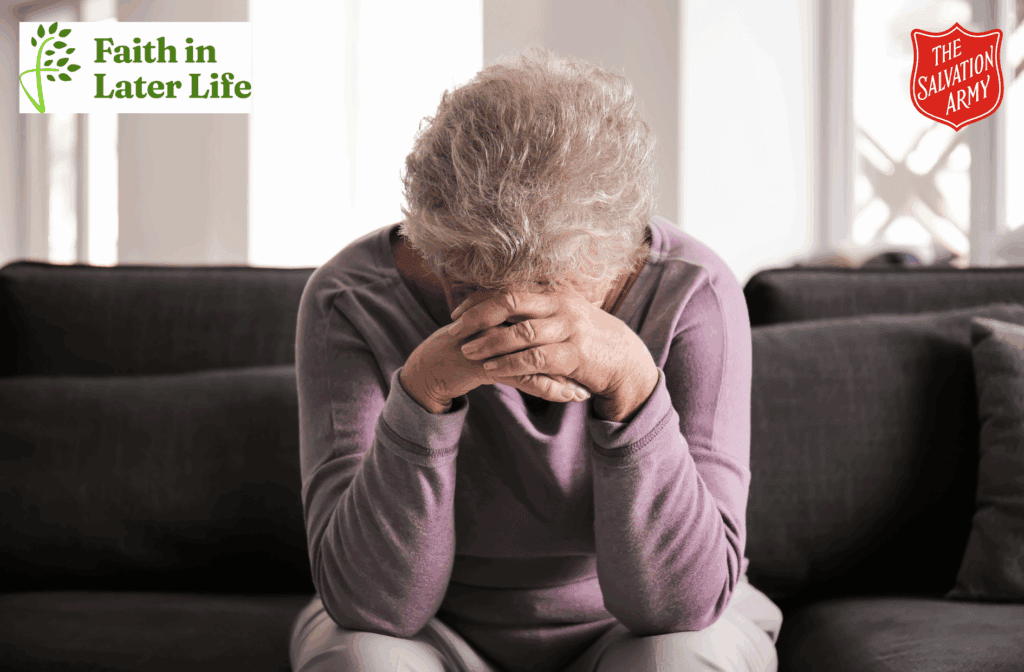‘Close To Home’ – The Reality of Elder Abuse

Author: Andrew Wileman
World Elder Abuse Awareness Day (WEAAD) is observed annually on June 15th to raise awareness about the abuse and neglect of older people and was officially recognised by the United Nations in 2011.
It’s hard to hear this, but the reality here in the UK is that older people are regularly abused and neglected by their own sons and daughters, by care home staff or have been physically or emotionally abused by those they trusted most. We receive calls at The Salvation Army from older people who have lost everything when their ‘loved ones’ took their inheritance early or sold their possessions.
But here’s the thing…… maybe elder abuse is so impossible to imagine that we simply decide not to. Perhaps our own abhorrence is too sad and too traumatic for us to comprehend? “Nobody would do that to my grandmother”
It is estimated from Hourglass the only UK charity dedicated to tackling elder abuse that one in six older people are victims of abuse. That’s over 16% of our mothers, fathers, uncles, aunties, grandmothers, grandfathers, friends and neighbours.
Elder abuse is defined as “a single or repeated act, which causes harm or distress to an older person”. Abuse defined in this way usually falls into one or more of the following categories –
- Financial: the illegal taking, misuse, or concealment of funds, property or assets of an
older person. - Physical: the inflicting, or threatening to inflict, physical pain or injury on a vulnerable
older person or depriving them of a basic need. - Emotional: inflicting mental pain, anguish, or distress on an older person through
verbal or nonverbal acts. - Neglect: refusal or failure by those responsible for providing food, shelter, health
care, or protection for a vulnerable older person. - Abandonment: the desertion of a vulnerable older person by anyone who has
assumed the responsibility for care or custody of that person. - Sexual: non-consensual sexual contact of any kind.
Often, the people who abuse older people are exploiting a unique relationship, either as a family member or a close friend, and from that reality it’s something that’s kept within the family and it’s not highlighted as an issue in the wider world. They are in a position of trust, whether through family bonds, friendship or through a paid caring role, and they exploit that trust. Victims of such abuse are often reluctant to take action against their abusers because they feel ashamed of having been taken advantage of, or because they do not want the criminal (often a family member) to withdraw their care and support.
The Christian Medical Fellowship in their report on Elder Abuse from 2023 concur that abusive behaviour towards older people can occur out of sheer evil and spitefulness, but often these things happen “when basically good people reach the end of their tether and lash out in frustration – and are then horrified at what they have just done”.
What Can We Do ?
Nurture, respect and care for all ages are at the heart of our ministry in our Churches and Centres. Scripture calls us to honour and care for those who are ageing, upholding their dignity as image-bearers of God.
‘Stand up in the presence of the aged, show respect for the elderly and revere your God. I am the LORD.’ Leviticus 19:32
This mandate and so much of the narrative from the Old and New Testament flows directly from the heart of God, who values every stage of life and shows special concern for the vulnerable.
Your Church can easily be “eyes and ears” to what is going on and watching out for the thing we least want to see or believe is happening behind closed doors. Let’s try to be very sensitive and very open to the fact that an older person who perhaps might have been a real positive personality suddenly becomes disinterested or unattached, or becomes in some way very distressed.
A word of advice – It can be very difficult for an abused or neglected person to talk about what’s been happening to them. Unless you’re concerned for their immediate health and safety and feel it’s vital to act straight away, give them time to think about what they’d like to do.
If you’re right and the person has been abused or neglected, ask them what they’d like you to do. Let them know who can help them, and tell them you can seek help on their behalf if they want or if it’s difficult for them to do so themselves. It’s so important to listen to what they say and not charge into action if this is not what they want.
There are also professionals you can contact. Your Church or Denomination will almost certainly have a safeguarding policy and a dedicated person or team who will be able to offer you advice and assistance. You can pass on your concerns to the person’s GP or social worker if appropriate. Local authorities have social workers who deal specifically with cases of abuse and neglect, the adult safeguarding co-ordinator is usually the person to ask for. You can also speak to the police about the situation. Some forms of abuse are crimes, so the police will be interested.
All of this is difficult and truly shocking, but the more we talk about it, the more we can help reduce the instances of elder abuse in our communities and prevent future harm to our most vulnerable.
Reflect and Respond
1. Pray for the courage to speak out against abuse of older adults. Prompt us not to look away.
2. Learn more about elder abuse so you can ‘spot the signs’ and carefully intervene as required. e-mail olderpeoplesministries@salvationarmy.org.uk for more information.
3. Which older person haven’t you seen for a while in your Church or Centre or weekday programme? Commit to calling in to ensure they are safe.
As well as being a Faith in Later Life Trustee, Andrew Wileman is the Assistant Director for Older People’s Ministries at The Salvation Army.
